French Presidential Election 2017 on Facebook – the First Round
This page archives our realtime analysis of Facebook engagement for the candidates of French Presidential Election first election round. The first election round took place on 23 April 2017. There were 11 candidates altogether. Emmanuel Macron, Marine Le Pen, Jean-Luc Mélenchon, François Fillon and Benôit Hamon were considered the most promising ones.
Facebook Engagement for Macron Peaked on the Election Day
On the election day, the top two on Facebook were the National Frond leader Marine Le Pen and the former Socialist Party member Emmanuel Macron (representing his own movement En Marche).
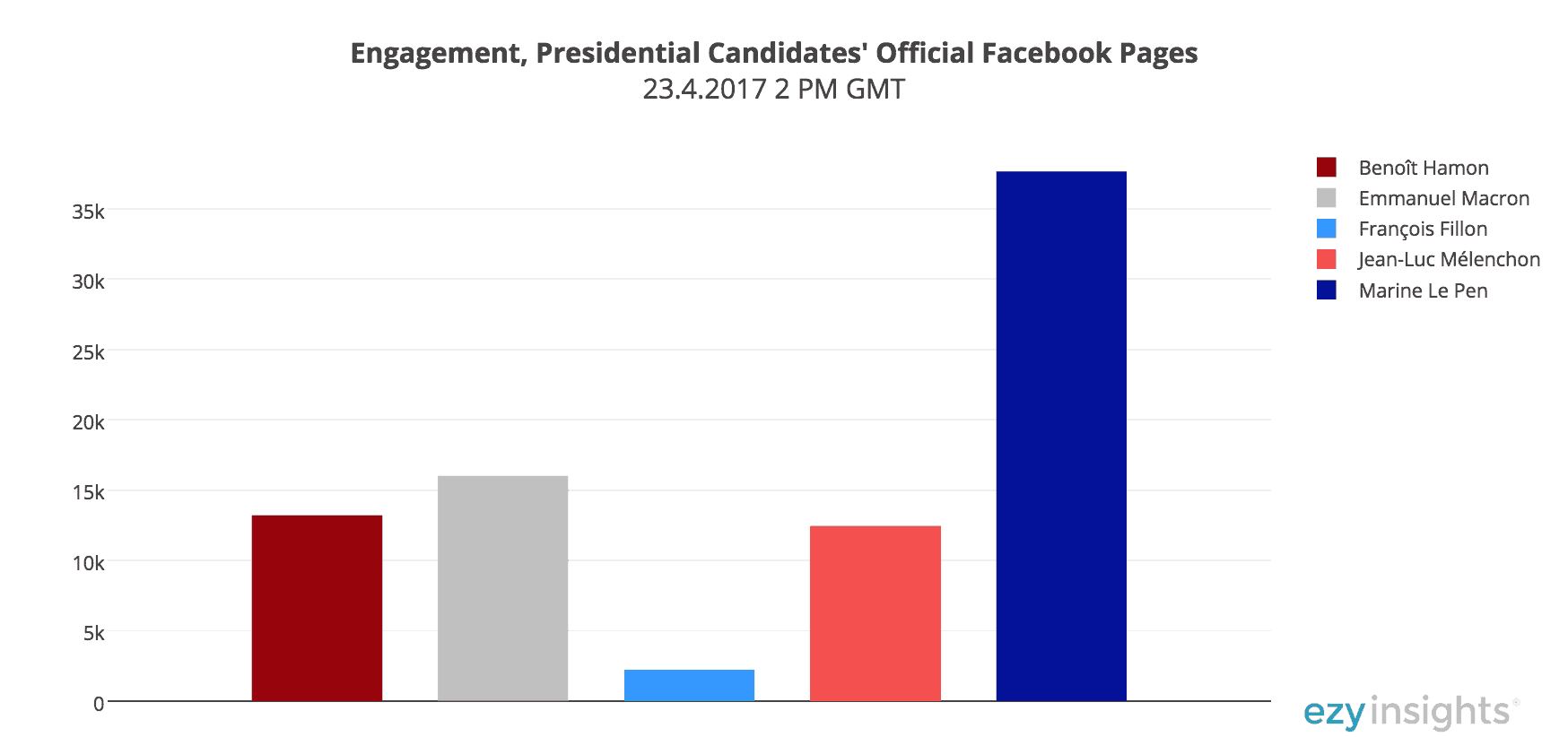
The top two candidates on Facebook are also the election winners. However, Facebook activity for Le Pen was much bigger than for Macron. Why?
Facebook Engagement Trends Correspond to Poll Trends and Political Events
Social media engagement can predict political candidates’ success. Donald Trump’s Facebook engagement was much higher than Hillary Clinton’s (read our analysis here).
Many French Election Facebook data patterns correlate with the poll results:
- Polls showed dramatic increase in support for the Left Party candidate Jean-Luc Mélenchon. Also Mélenchon’s Facebook engagement grew.
- The Former Prime Minister, Republican François Fillon, came second on Facebook for a long time. After the “Penelopegate” his support went down both on polls and Facebook.
- Macron had much less Facebook fans than Le Pen. His Facebook engagement was relatively low. However it skyrocketed during the Final round.
- The Socialist Party candidate Benoît Hamon was doing worst in the polls. Also his Facebook page was smallest of the five “big” candidates.
However, while social media engagement predicted the US Presidential Election results much better than polls, in the French Presidential Election, the polls predicted results better.
What was at stake social media-wise?
Total Facebook Engagement was Biggest for Le Pen and Mélenchon
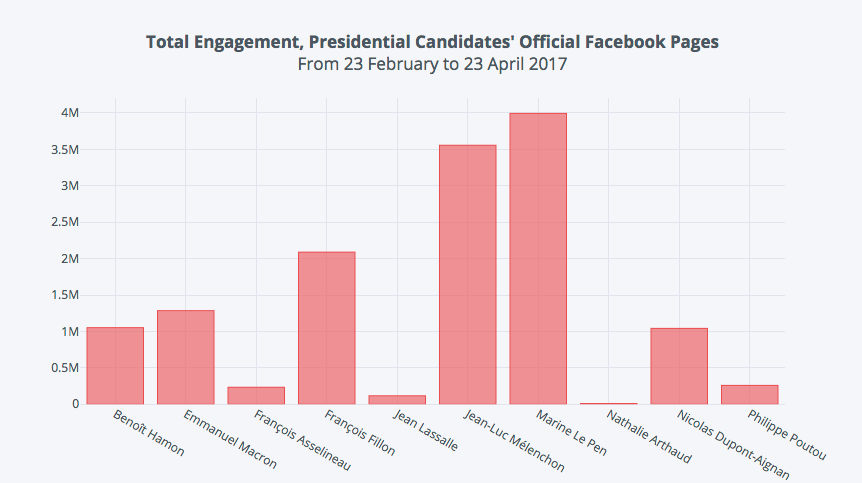
The chart above shows total engagement for the candidates before the first election. Le Pen’s and Mélenchon’s Facebook engagement is clearly the highest.
The main explanation is that Le Pen and Mélenchon had the biggest amount of Facebook followers: their messages had more reach than others. This also means that even tough Macron was popular in the polls, he was not as popular on Facebook.
Critical Tones Did Best
The chart below documents the daily engagement for the “big” candidates.
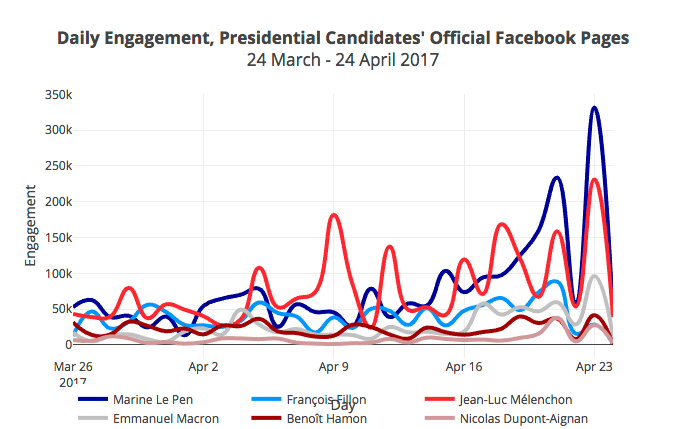
The chart also shows engagement for the smaller center-right party “Debout la France” candidate Nicolas Dupont-Aignan. His pages’ engagement approached the “big” candidates’ figures.
Le Pen’s, Mélenchon’s and Dupont-Aignan’s pages spiked during important events. Dupont-Aignan’s engagement skyrocketed to over 400K and went past all other candidates during a television debate (TF1 on 19th March). This was when he protested for being excluded from the debate.
This higlights the importance of emotionally engaging, critical-toned messages on Facebook. The same applies to Le Pen (and Mélenchon).
“Small” Candidates’ Baseline Did Not Rise
The five biggest candidates’ engagement was regularly above 10K per day. For the smaller candidates, the baseline was close to 1K engagements per day.
Philippe Poutou’s engagement had several occasional spikes: his engagement rose above 30K at times. François Asselineau’s engagement rose over 10K several times. The rest of the smaller candidates – Jean Lassalle, Nathalie Arthaud and Philippe Poutou – had less activity. Jacques Cheminade did not have a Facebook page.
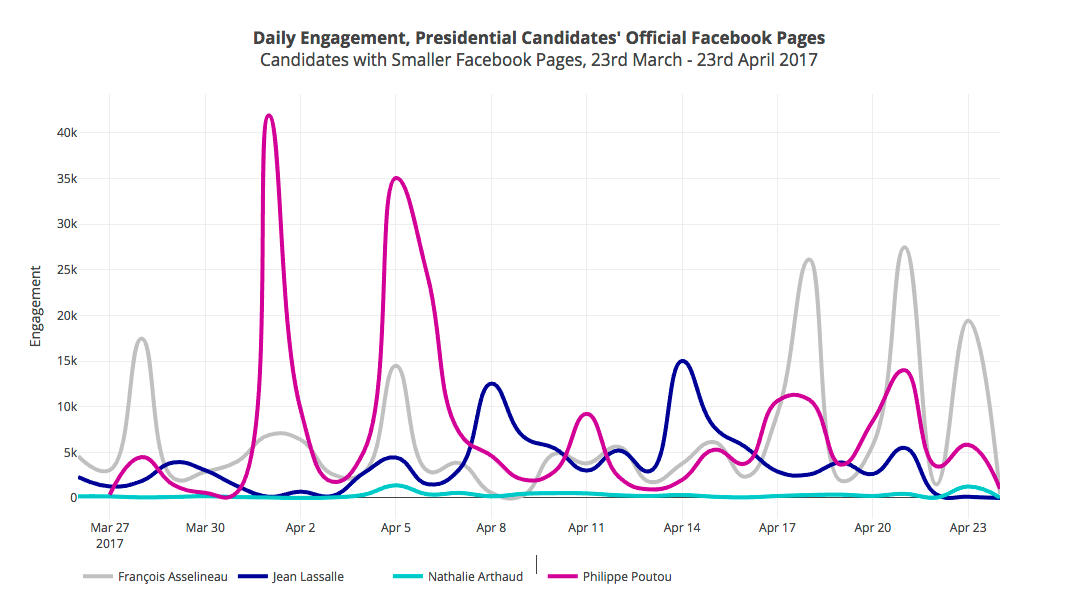
The “small” candidates’ engagement baseline stayed low. Despite the occasional spikes, their engagement did not accumulate, and they remained small. The baseline did not rise even towards the election day.
Dynamic Posting Strategies were Successful
Posting strategies matter for politicians. Donald Trump posted lots of live videos. He also posted more often than Hillary Clinton. His page was also more strategical. It posted especially during important events.
Le Pen was the most frequent poster during the French Presidential Election.
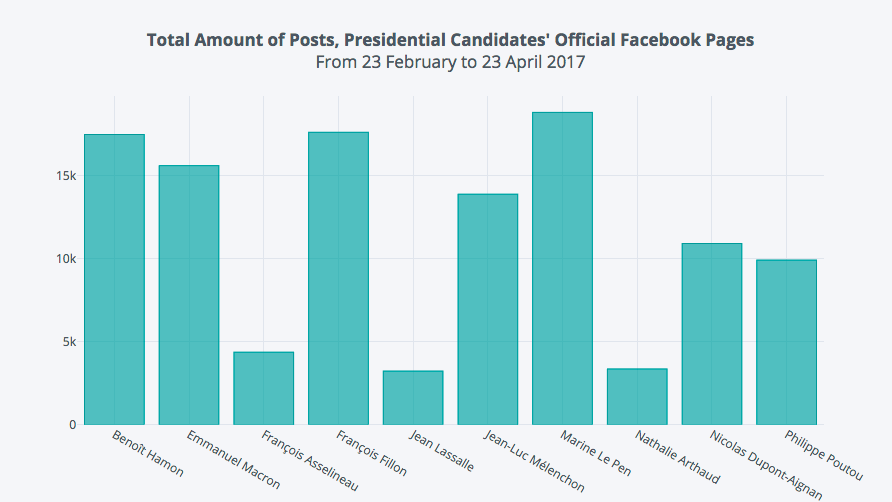
Fillon and Hamon were the second frequent posters, but this was not reflected in their engagement. Their fanbase was simply too small – they did not have an audience.
All candidates strategically increased posting towards the election day, and especially Le Pen’s and Macron’s posting strategy was dynamic.
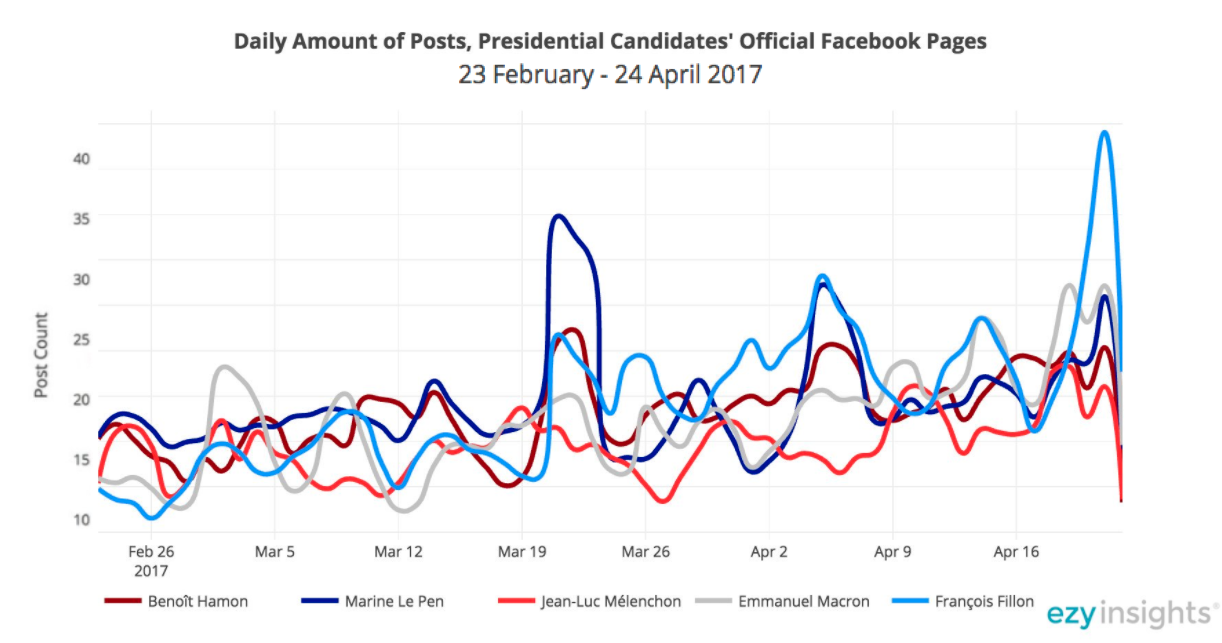
Le Pen’s Facebook page increased posting significantly on the 20th and 21th March, at the time of the televised Grand Debate between the candidates. Macron increased posting in the beginning of March. Macron’s posting spree occurred strategically during Fillon’s “Penelopegate” that would benefit especially Macron.
Fillon tried and increased his posting the most, but this did not have a big effect anymore – his engagement had collapsed after the Penelopegate.
Mélenchon’s Posts Performed Best
Mélenchon posted less than many others, but his engagement was high. In other words, his posts were more effective than others’.
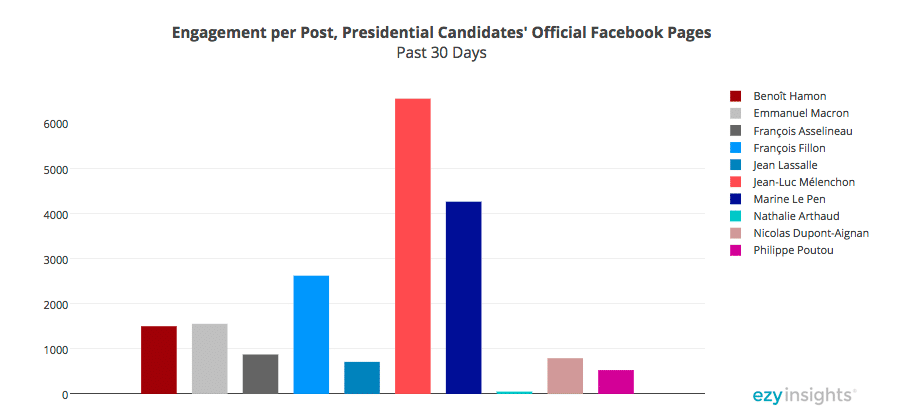
Mélenchon’s audience was almost as big as Le Pen’s (over 1K followers). He posted less frequently than Le Pen, so there were less posts to engage with for an audience of similar size.
What do we Learn?
Facebook engagement often matches with poll trends. It can be used to assess the directions that are going to take place. But based on the result of the US Presidential Election, the order of candidates could have been Le Pen, Mélenchon, Macron, Fillon and Hamon.
Le Pen’s situation corresponded quite to the polls. But Mélenchon’s Facebook engagement was “too big” and Macron’s “too small”.
We can speculate the reasons behind the huge Facebook activity for Le Pen and Mélenchon. There are at least these possible implications:
- Le Pen and Mélenchon had biggest amount of Facebook fans, and thus the biggest audience. This helps to explain their result.
- Critical, even provocative tone of voice gets recognized on Facebook. Both Le Pen and Mélenchon are provocative – they aimed at producing affective responses in the public. Macron’s tone of voice was milder.
- The fans of Le Pen and Mélenchon may still hold views that were not mediated into the election result.
- One factor may be related to different lifestyles in different fan groups. Engaging with politics on Facebook more than average may reflect socioeconomic factors.
- Facebook cleared 300 000 fake accounts before the French Election to protect it from trolling, but there is always the possibility of fake engagement taking place.
